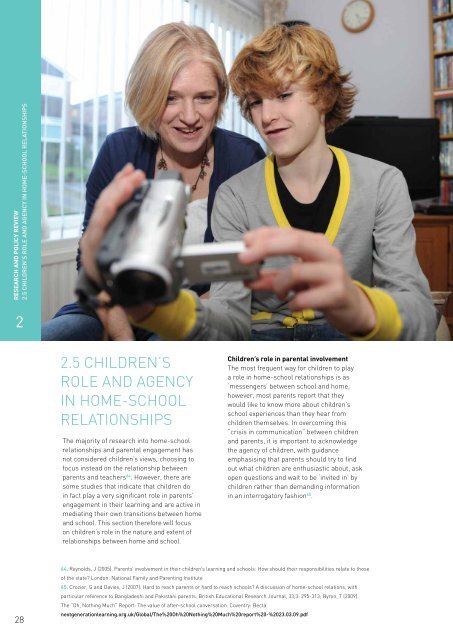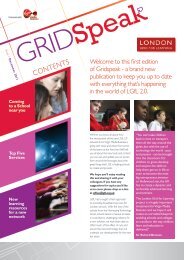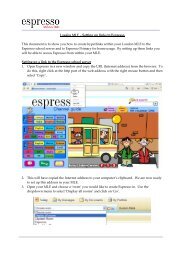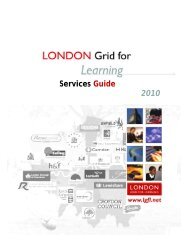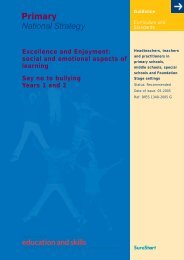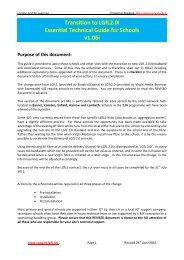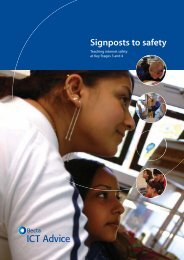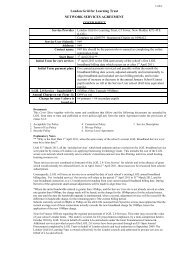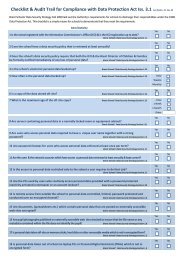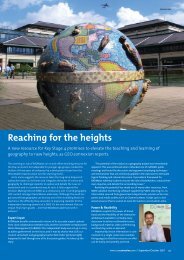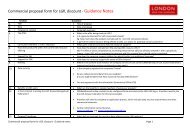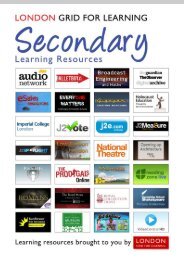RESEARCH AND POLICY REVIEW2.5 CHILDREN’S ROLE AND AGENCY IN HOME-SCHOOL RELATIONSHIPS22.5 CHILDREN’SROLE AND AGENCYIN HOME-SCHOOLRELATIONSHIPSThe majority of research into <strong>home</strong>-<strong>school</strong><strong>relationship</strong>s and parental engagement hasnot considered children’s views, choosing tofocus instead on <strong>the</strong> <strong>relationship</strong> betweenparents and teachers 64 . However, <strong>the</strong>re aresome studies that indicate that children doin fact play a very significant role in parents’engagement in <strong>the</strong>ir learning and are active inmediating <strong>the</strong>ir own transitions between <strong>home</strong>and <strong>school</strong>. This section <strong>the</strong>refore will focuson children’s role in <strong>the</strong> nature and extent of<strong>relationship</strong>s between <strong>home</strong> and <strong>school</strong>.Children’s role in parental involvementThe most frequent way for children to playa role in <strong>home</strong>-<strong>school</strong> <strong>relationship</strong>s is as‘messengers’ between <strong>school</strong> and <strong>home</strong>,however, most parents report that <strong>the</strong>ywould like to know more about children’s<strong>school</strong> experiences than <strong>the</strong>y hear fromchildren <strong>the</strong>mselves. In overcoming this“crisis in communication” between childrenand parents, it is important to acknowledge<strong>the</strong> agency of children, with guidanceemphasising that parents should try to findout what children are enthusiastic about, askopen questions and wait to be ‘invited in’ bychildren ra<strong>the</strong>r than demanding informationin an interrogatory fashion 65 .2864. Reynolds, J (2005). Parents’ involvement in <strong>the</strong>ir children’s learning and <strong>school</strong>s: How should <strong>the</strong>ir responsibilities relate to thoseof <strong>the</strong> state? London: National Family and Parenting Institute65. Crozier, G and Davies, J (2007). Hard to reach parents or hard to reach <strong>school</strong>s? A discussion of <strong>home</strong>-<strong>school</strong> relations, withparticular reference to Bangladeshi and Pakistani parents. British Educational Research Journal, 33,3: 295-313; Byron, T (2009).The “Oh, Nothing Much” Report: The value of after-<strong>school</strong> conversation. Coventry: Becta.nextgenerationlearning.org.uk/Global/The%20Oh%20Nothing%20Much%20report%20-%2023.03.09.pdf
In one of <strong>the</strong> few studies to explicitly focuson children’s role in parental involvement,children were seen to play a major role in <strong>the</strong>extent of <strong>the</strong>ir parents’ involvement in <strong>the</strong>ireducation, with children taking an active orpassive attitude to facilitating ei<strong>the</strong>r <strong>the</strong>irparents’ involvement, or ‘uninvolvement’.That is, children would ei<strong>the</strong>r actively seekparents’ involvement or uninvolvement, orpassively ‘go along with’ parents’ involvementor uninvolvement. Children may involve <strong>the</strong>irparents in some aspects of <strong>the</strong>ir learning,while resisting involvement in o<strong>the</strong>rs.Children who actively involved <strong>the</strong>ir parentswere usually motivated by a desire forintimacy with <strong>the</strong>ir parent, most often<strong>the</strong>ir mo<strong>the</strong>r, ra<strong>the</strong>r than to improve <strong>the</strong>ireducational achievement, emphasising <strong>the</strong>importance of <strong>the</strong> parent-child <strong>relationship</strong>.Children may resent <strong>the</strong>ir parents’ ‘intrusion’into <strong>school</strong> matters because <strong>the</strong>y feelcompetent to deal with <strong>the</strong> situation alone,<strong>the</strong>y think <strong>the</strong>ir parents will be unable tohelp, or because <strong>the</strong>y fear <strong>the</strong>ir parents’involvement may make matters worse.However, children’s efforts to keep <strong>home</strong> and<strong>school</strong> separate does not imply that <strong>the</strong>y valueone sphere (<strong>home</strong> or <strong>school</strong>) at <strong>the</strong> expense of<strong>the</strong> o<strong>the</strong>r – some children maintain separationwhile highly valuing both <strong>home</strong> and <strong>school</strong> 66 .Children’s personal learning agendasA study of young children showed how <strong>the</strong>yconnected <strong>the</strong>ir learning at <strong>home</strong> and at<strong>school</strong> to fur<strong>the</strong>r <strong>the</strong>ir own ‘personal learningagendas’ 67 . Children were able to exploit,appropriate and transform <strong>the</strong> opportunitiesfor learning presented by <strong>school</strong> and <strong>home</strong>to make <strong>the</strong>m personally meaningful. Forexample, while two children who appear to belearning <strong>the</strong> same thing, such as how to ridea bike, will learn <strong>the</strong> same skills, <strong>the</strong>y mayalso appropriate this experience to <strong>the</strong>ir ownmore personal learning agendas. One childmight connect learning to ride a bike withlearning about freedom from <strong>the</strong> <strong>home</strong> whilefor ano<strong>the</strong>r it might connect to competitionwith siblings.This deeper level of learning was intimatelyconnected to children’s own deep concerns;<strong>the</strong>ir own personal agendas informed what<strong>the</strong>y took from <strong>the</strong> learning experience.Children in this study appropriated <strong>the</strong>irlearning experiences to explore personallysignificant issues, such as death, or how todeal with being seen as different from peers.To understand children’s personal learningagendas, teachers and parents need to listento <strong>the</strong>ir voices and perspectives on <strong>the</strong>irlearning experiences.CHAPTER RESEARCH TITTLE AND POLICY HERE REVIEWCHAPTER 2.5 CHILDREN’S SUB-TITTLE ROLE AND HERE AGENCY IN HOME-SCHOOL RELATIONSHIPS2 ?66. The Children 5-16 study sought to find out how children understand and influence <strong>the</strong>ir parents’ involvement in <strong>the</strong>ir education.See: Edwards, R, Alldred, P and David, M (2000). Children’s understandings of parental involvement in education. Children 5-16Research Briefing Number 11, ESRC. www.hull.ac.uk.chidren5to16programme Edwards, R and Alldred, P (2002). A typologyof parental involvement in education centring on children and young people: negotiating familialisation, institutionalisation andindividualisation. British Journal of Sociology of Education, 21,3: 435-455, and Alldred, P, David, M and Edwards, R (2002). Minding<strong>the</strong> gap: children and young people negotiating relations between <strong>home</strong> and <strong>school</strong>. In R Edwards (ed), Children, Home and School:Regulation, Autonomy or Connection? London and New York: Routledge, 106-12067. Maddock, M (2006). Children’s personal learning agendas at <strong>home</strong>. Cambridge Journal of Education, 36,2: 153-16929


